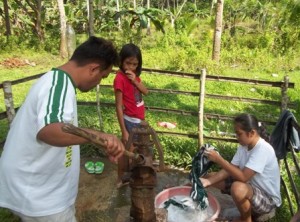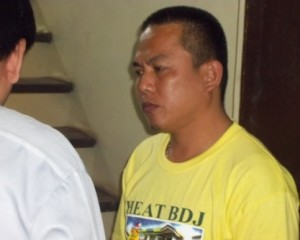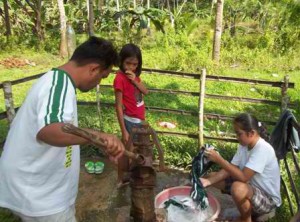By NESTOR B. RAMIREZ

TAGBILARAN CITY—Less than a month from now, 13-year-old Angelica Cunado will take the witness stand and face the man who she witnessed gun down her mother, Gabriela Women’s Party coordinator Liezelda Cunado, five years ago.
“Mahadlok man pero kinahanglan nga isug gyud para sa kaso sa akong mama (I am afraid, but I have to be strong for the sake of the case of my mother),” said Angelica who will be telling the court here on June 17 that she and her 11-year-old sister Dianne saw from a window of their two-story house in Barangay Panadtaran in Candijay town Joel Bayron shoot their mother in the early hours of April 3, 2006. She was only 8 then.
On the night of the incident, Liezelda and her husband Gerry, then Bayan Muna coordinator, had an altercation with their neighbors, the Bayron couple, on their front yard. They were able to settle the matter but minutes after, Bayron allegedly went back and shot the Cunados, leaving Liezelda dead and Gerry wounded.
The Cunados had been tagged as communists and terrorists in their community. They were active in joining rallies and mass actions in Bohol.
Angelica was supposed to take the stand during the hearing Friday at the Regional Trial Court of Bohol Branch 48 in Tagbilaran City, but public prosecutor Eric Ucat decided to continue with her father’s testimony.
Older and much braver, Angelica said she had been properly briefed on what to do when she faces the court and her mother’s killer.
The case of Liezelda Cunado is one of the hundreds of extrajudicial killings that remain unsolved. The spate of killings of left-leaning activists started in 2001 as part of the government’s anti-insurgency program. In Cunado’s case, with the suspect behind bars, her family members and lawyers are hoping the trial would end with a conviction.
“I am confident of a conviction, but what I cannot assure if it is for murder because it is the court that will determine that,” Ucat said.
He added he is reviewing the sworn statement of witnesses to ensure that they would get a conviction for murder. At least six more witnesses are to take the stand.
Ucat also said he is seeking help from authorities to find and arrest Bayron’s wife Gazella, who is also facing murder charges.
Bayron, in an interview with VERA Files, denied they were tasked to liquidate the Cunados in order to neutralize their anti- government activities in Bohol.
“It is not true that I am a military asset,” Bayron said in Bisaya.
Bayron, a member of the Citizen Armed Force Geographical Unit under the 15th Infantry Battalion in Bohol, has been in jail for five years.
Days before the killing, the Cunados told the human rights NGO Karapatan that unidentified persons they suspected to be military men monitoring them were going in and out of the Bayron residence. The Bayrons’ house was used as a base for the military to infiltrate the community, sources said.
No to settlement
In the May 9 hearing, Cunado’s family formally turned down Bayron’s plea to downgrade the murder charges to reckless imprudence resulting into homicide.
Downgrading the charges would mean a prison term of only four years and one day, which Bayron has already served, versus life imprisonment for murder.
Had the family agreed to settle, Bayron could have walked out of the court a free man.

Cunado said in an interview he refused the settlement because he wants justice for the killing of his wife.
He said he told Bayron that while he had forgiven him, the trial must continue because seeking justice is the “absolute pursuit of his family.”
Defense lawyer Danilo Bantugan said there were talks of settlement as early as last year. He added that before he filed the plea in court, Cunado almost agreed to a compromise.
But he said Liezelda’s parents intervened after the postponed Jan. 17 hearing, asking for damages.
“The negotiation was hampered after the parents of Liezelda demanded money, and we couldn’t give any,” Bantugan said.
Cunado, however, denied that Liezelda’s parents made such a demand.
Bayron told VERA Files that Cunado approached him during the hearing in September 2010 and told him that he was ready to move on with his life, and that even a conviction for murder could not bring his wife back to life.
“I feel bad after Gerry changed his decision because it was like giving false hope,” Bayron said.
Cunado denied he initiated the talk, saying it was Bayron who approached him during one of the hearings and asked for forgiveness.
Cunados as communists?
In an earlier interview, Bayron said apart from being relatives, he and the Cunados supported the same candidate in the 2002 local elections.
“I was the campaign manager of a candidate that was also supported by Bayan Muna and Gabriela,” he said.
Bayron said he had even defended the Cunados on several occasions against accusations by neighbors that they were communist rebels.
“I understand their cause especially the issues about wage increase,” he said.
During Friday’s hearing, the prosecution established that the Cunado couple were activists.
At the continuation of his testimony, Gerry explained why most of the documents pertaining to the case, including affidavits of the witnesses, were prepared by Karapatan Bohol Chapter and not by the police in Candijay town where the incident happened.
He said that it was Karapatan who first offered help and was persistent in pushing for the filing of the case. He told the court that it is normal for an organization like Karapatan to be taking the lead because he and his wife were both activists.
Karapatan spearheads campaigns against the extrajudicial killings and other acts of impunity.
Gerry said the police offered their help in filing the case, but everything had been done by Karapatan by then.
Coping with loss, trial
Prosecutor Ucat told the court on Friday that Gerry will be presenting receipts of expenses incurred for Liezelda’s burial and his hospital expenses.
Gerry, who said he was shot twice by Bayron, has a four-inch long scar on his left arm and a one-inch- diameter wound on his right chest.
Bayron had earlier offered as part of the settlement an educational plan for Angelica and Dianne, who are his nieces (the Cunados are his second cousins). He said he would have to borrow money from his aunt for this.
These days, Gerry, a peasant, has been finding it hard supporting his two children, especially with the ongoing trial.
He almost did not make it to the May 9 hearing, the first time he took the stand, had it not been for Karapatan. The human rights group’s local chapter has been providing financial support and protection to the Cunado family. Candijay is about 100 kilometers away from Tagbilaran City.
Gerry, however, did not make it to the hearing on April 3, the sixth anniversary of Liezelda’s death, because he did not have money for fare.
He said he instead spent the little money he had, P500, for the pancit and food he promised his two daughters to commemorate their mother’s death.
For his part, Bayron said ever since he surrendered to authorities he has had no contact with his family. He said that his wife fled with their three sons and daughter, ages 8 to 15, after she was implicated in the case and was issued a warrant of arrest.
“I surrendered so that justice can be served but instead they included my wife in the case,” he said. “I miss them very much, but there is nothing I can do anymore.”
(This story is part of the VERA Files project “Human Rights Case Watch” supported by The Asia Foundation and the United States Agency for International Development. )
